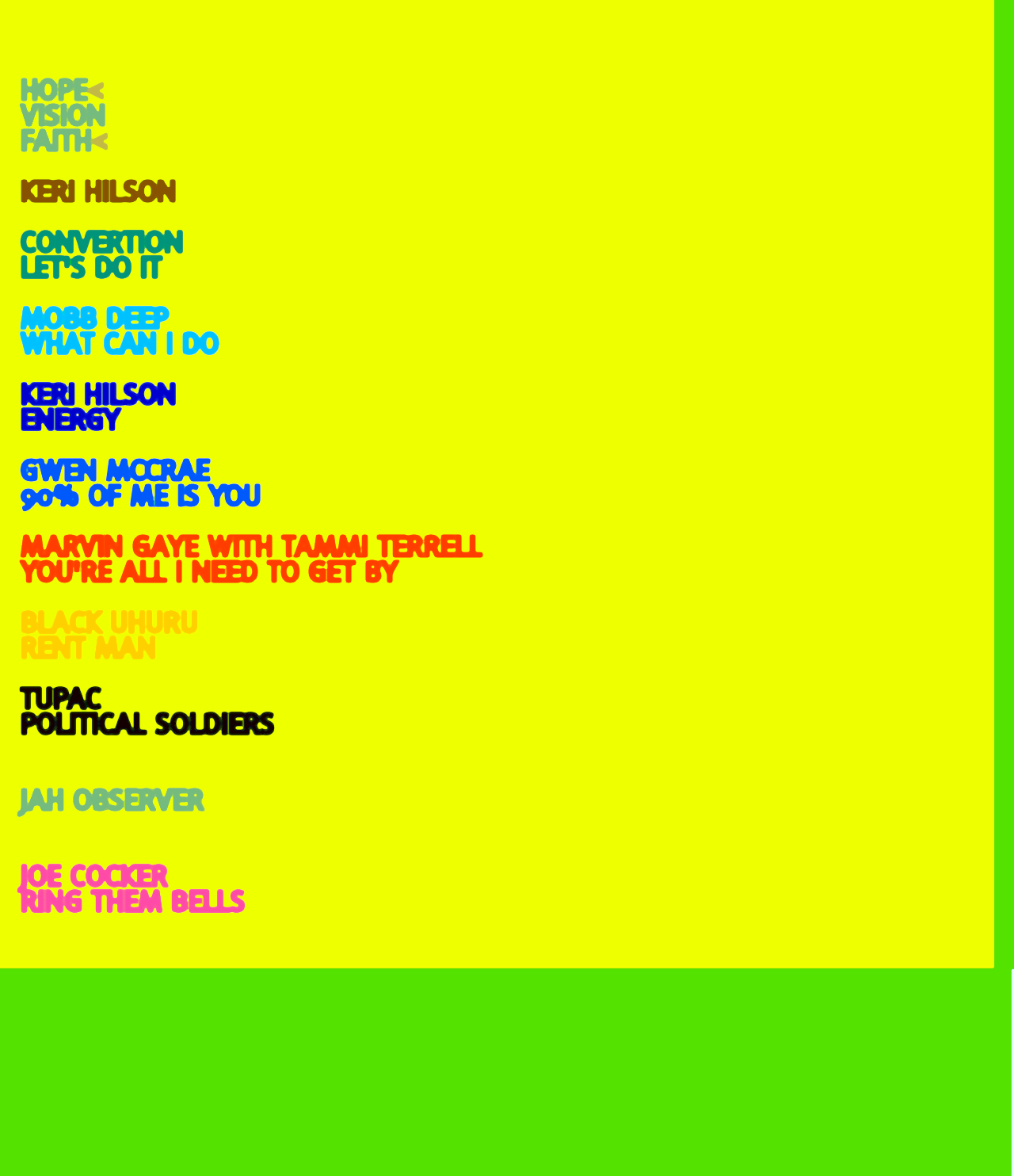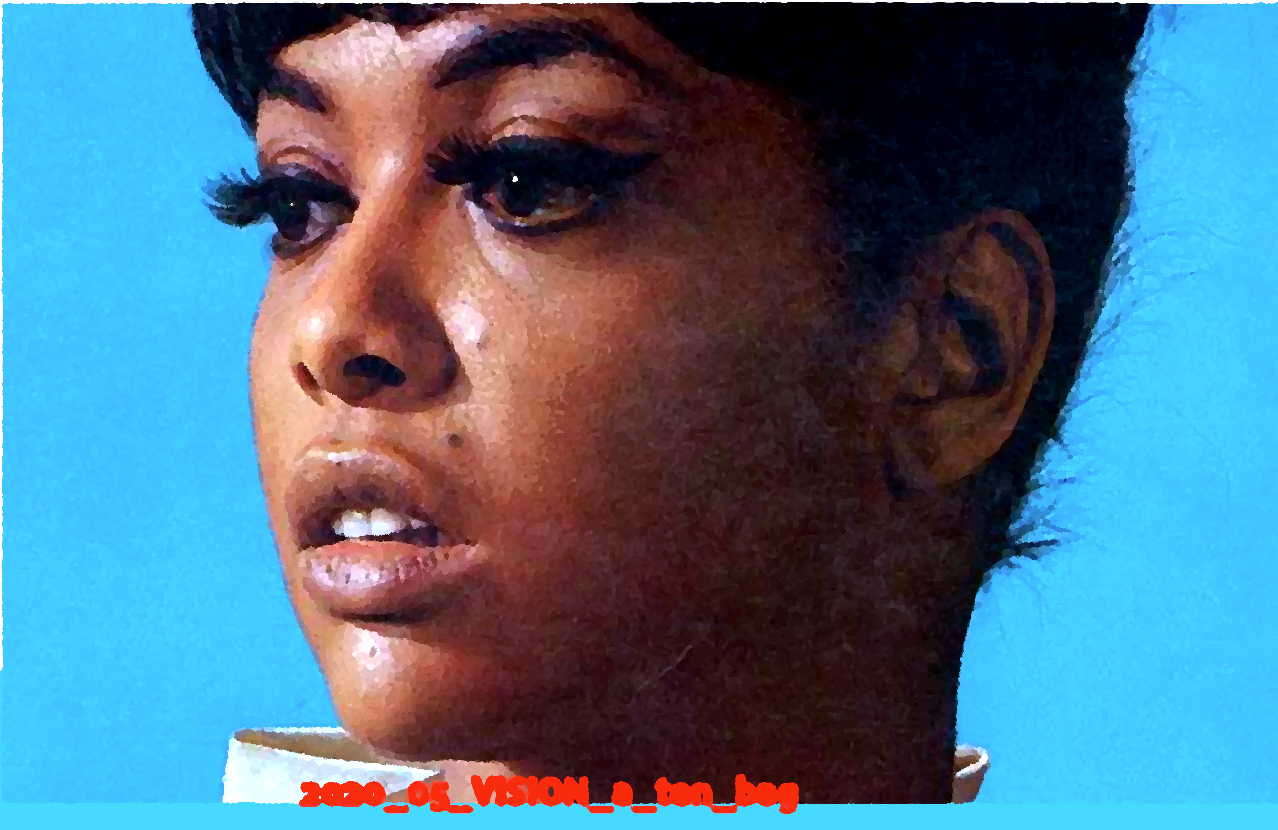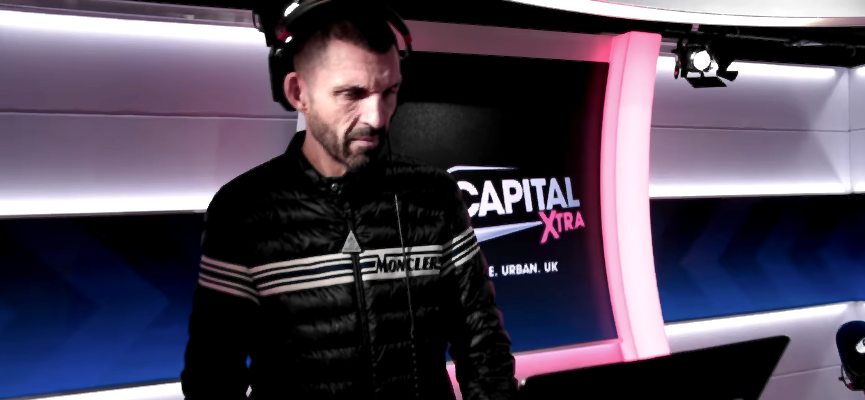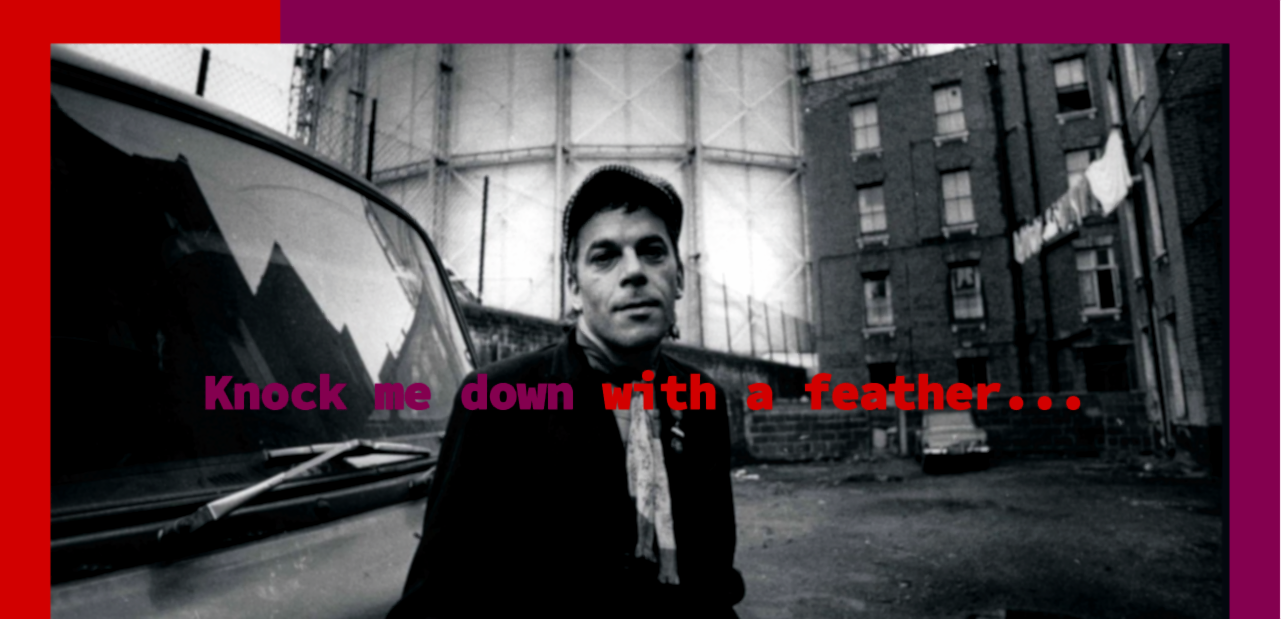2020_05_vision_a_ten_bag Part 1.
NEW Stylee. First post, reviewing a playlist. As usual, written and published as soon as produced. The next Plant a Seed indicates the last is completed. OK, complete as it'll ever be. "Thanks for looking".

Led sound/wise to Mikey Dread and 'stylee' talk. Feel like some words and power, here; "breaking down the walls".
We've got to break down the walls
Down inna Babylon, that separate us
We've got to break down the walls
Down inna Babylon, that seem to divide us
We need peace and love
Down inna Babylon around and beside us
We're from the righteous tribe
Down inna Babylon, and Jah Jah will guide us
We've got to break down the walls
Down inna Babylon, that separate us
We've got to break down the walls
Down inna Babylon, that seem to divide us
It's time we check ourselves
Down inna Babylon, and know where we're going
Instead of playing bad
Down inna Babylon while our problems are growing
We've got to break down the walls
Down inna Babylon, that separate us
We've got to break down the walls
Down inna Babylon, that seem to divide us
Ladadada
Alright, alright
We've got to stand up strong
Down inna Babylon, no matter the pressure
We need some action now
Down inna Babylon and the sooner is the better
Come make we chant it down
Down inna Babylon and live it forever
Come make we chant it down
Down inna Babylon and make we love it forever
We've got to break down the walls
Down inna Babylon, that seem to divide us
We've got to break down the walls
Down inna Babylon, that surrounds us
Break down the walls, that separate us
Break down the walls, that surrounds us
Break down the walls, that seem to divide us
Break down the walls
Down inna Babylon, and Jah Jah will guide us
Solidarity inna Babylon, it shall be our battle
'Cause when the right time come
Down inna Babylon, dis yah battle will be hotter
Solidarity down inna Babylon, it shall be our battle
'Cause when the right time come
Down inna Babylon, dis yah battle will be hotter
We've got to break down the walls
Down inna Babylon, that seem to divide us
We've got to break down the walls
Down inna Babylon, that seem to separate us
We've got to break down the walls
Down inna Babylon, the walls that surrounds us
We've got to break down the walls
Down inna Babylon, like the days of Jericho
― Mikey Dread

REWIND:
"...original roadside G.'s."
Ha ha,... 'Dat' me and mine. So original, to be lost treasure.
South London, late 90s to about 2004. SE4 to SW9.
Ref, "Block Five".
Freestyle isn't every rapper's strength. Considered Skinnyman, for the longest time, the Mo., Ali., undisputed, heavyweight champ. R.A. by default, no notes, and freestyle's. That, and Conviction, with unusual depth and passion. Think it must be time for another; re, re, re... wind. Be 'something else' and hear the non bleep'd version.
Looked up the video we watched. About 2001ish, YMCA, Stockwell Road SW9. At home with mates, and managing them. In 'Ace' room, with 'Ske' and all, squeezed in. Reckon my first look back at the vid., since, ...then. Chuck up, Chester P's one, on the same DVD. Might have been a VHS, ohhh, are.
"Best to Paddy" – mutual friend – "...and Skinny". If you ever see the post, "thanks 'Pad' for all you taught me".
Look at Skinny, twenty years on, gives a precise and accurate history of UK Rap. Concise and clear:
"I'd like to stress this, it comes from Saxon, and Coxsone, and original Dub Foundation."
He knows, because... he was busting into their dances and raves, jumping for a slot to spit his raps.
Before my time and into rap and brief, three or four year, "in it".
First, and most. For years. Once others from the UK rose up, 'rap battle' nights, kicked off and Skinny, in one, was expected to win. His other skill was as MC for the night itself.
How come, was convinced Chester P, would be 'huge' by now. No, a lot sooner. Banging all the way to now, eh. What a history, from late 90s to now.
Up goes one from last year.
Many of the songs on the playlists or on a post, go up without hearing. Or, remembering, that long ago; takes ten seconds to confirm. Not yet, taken one down, once played.
Boy, get the 'prophetic impressions', even here, ten months ago.
Last hits, and 'intro for 2020_05_vision_a_ten_bag'.
Track 1, 2... to go.
Nb, Clip below, Triggers on 'same-sex,... sex', and love. Reasoned about this, with many or all I met, or knew. Easy, shock-em-up, and challenge any assumed confidence in Biblical Theology.
Or, what NYC and San. Fran. was like, early 80s? All in all, no one proper 'homo-phobe', when pushed. A 'personal conviction with understanding', might sum up the stand of most. Not 'positive about' but not a problem with anyone who is, or 'are' and alt. perspective.
[In case ya wondering? Disclosed here and there, 'it ain't me babe'. Looking for a wife. Not the Govt., might add, registering kind.
Waiting on God. Someone to call, "m'girlfriend.]
"Welcome to a one-person, dating website".
Finish the 'intro' from Mr. Chatterbox, but nah Mr. Chattychattymouth I trust. A song any day now, making a 'list. Chat on, the certainty I had in writing a post on our 'day up the park'. Can't find. All to say, if y'wondering about the shots of person on the side of the stage? The footage is part of the drama in The Clash film.
The Gladiators replaced U. Roy at the Reading Fest. Must write what happened, see; truthscoop.net/december-playlist.
Low an' behold, on another post, or y'could say, "almost, a post". About one of the greatest musical expressions of all time:
harlem-spartans-kennington-where-it-started.
Up the park.
Cor, Talk about "Smashes it". R.A. gets a REWIND, and a RE-POST. Colossal stuff.

Tim Westwood gets it. Wouldn't underestimate the man. Misjudge the mega–push and explosions in Hip-Hop. Ske, aka Skemma One, was a central volunteer, in one of two of Westwood's Street Teams. Something like hip-hop evangelism, with dynamite dating opps., and abundant networking. Ske spoke well of him. Said he was, down to earth, respectful manners and, "looked after them" e.g. gave extra quids here and there, while good for a jumbo burger bill. Have my little antidotes and no beef or bitch on Tim, if you know the Choice/Capital history?
Yet to write about about 279. DJ 279. Choice FM on Friday nights, 8 to 11 pm. Taken to meet him by a rapper, and his friend. 279 visited us in Brixton, having been given had an 'open door' to turn up an hour or so before the show. A few visits and fascinating chats with him. We talked about making a film, or series of videos. Didn't stay past a song or two, although remember one time and someone raping to freestyle and interview. Was it Speaks, producer and rapper from Brixton Hill and crew, Speaksworld. Know 279, played his rap and remix/production of 'Ring My Bell, Anita Ward'. Will muster thoughts.
A Clever Trevor would be able to contrast and compare it with the NYC 1980, WBLS/KISS merger. Less or not known.
Know... I dashed home and get a cheeky thrill at a name check, inc. others, I'd leave him. Not about me and meeting; The Music. Best ever. For me, not since 1984, NY radio.
279 mixed and commented on the hottest US, while faithful and honest and the underground UK voices and producers. 279 carried it most, giving UK rap in the 90s and early 2000s a predominant, radio show. Man didn't drop the ball, kept me gripped and gushing, "...and who is, this?"
Not the big exclusive, all roads lead to Westwood, Saturday night. Yet, for the young disciples of the beats, felt to them a 'religious' exercise and faithful attendance at Westwood's, FM radio, gathering.
Peep around me helped with my unmistakable 'rap-ignorance'. Homemade mix-tape or two but all I knew about were the US instrumentals. Backing tracks, for all the rap coming out. Not for release and commercial profit. Not, nowadays archived and in the public realm, aka YouTube.
From 2000ish stated, 279 on Friday nights, was the conversion.
For my latest "I seen the light" and "it's happening". Decided to take a serious look, not confident in finding so much.
It was Nov 26, 2019. Found GRM. Three songs or four songs released so far, that morning. Plumped for Country Dons - Sticky Situations. Be the one song that knocked me over, sideways, and reeling.
On Clever Trev., fave of mine's is sneaky mix, and another Blockheads' and Ian D.classic. On the 'Bonus Balls' playlist.
"This is some long ting...".
Tar for coming. Ian, and out.
Might bang the volume up, quiet start?

I looked to find where the image was first posted on Truthscoop, instead, seen a paragraph on 279.
Passing it on.
truthscoop.net/01-20-Maps-and-Charts
In 2012 there was s a WBLS and Kiss merger. Given some context in a quote I've found. Next post, will add my comments and impressions. The account below misses some salient facts and shifts.
WBLS, in particular, was borne out of the era of the civil rights struggle and black power self-determination.
Along with many other leading black stations of the past — WDAS in Philadelphia, WDIA in Memphis, KMJQ in Houston, WVON in Chicago, WERD in Atlanta, WJLB in Detroit — WBLS and black radio nationally were the nucleus of American-American culture, entertainment, and even politics during the industry’s heyday.
The late broadcaster and magazine publisher Jack “Jack The Rapper” Gibson used to tell of times when on the air at WERD; that Dr. Martin Luther King, whose Southern Christian Leadership Conference offices were in the same building as his station, would have the microphone passed from a studio window up to his office window, so he could announce the latest march or rally to the Atlanta audience.
This was a world well before BET, Twitter, Instagram, “soul” luxury liner cruises and the fame industry known as Kardashian.
WBLS was created as the radio vehicle of the Inner City Broadcasting Company, led by the late, dapper entrepreneur (and former lawyer for Malcolm X) Percy Sutton. Formerly known as WLIB-FM, the station changed its call letters to WBLS in 1974 — reflecting the “World’s Best Looking Sound,” or in sync with the cultural nationalism so dominant in urban America at the time: “The Total Black Experience In Sound.”
Frankie Crocker served as the suave maitre’d for soul served on a silver platter. Angular, smooth, and incessantly debonair, he epitomized a type of upwardly-mobile “cool” that helped set an attitude tone for black New Yorkers in the 1970s. As program director for BLS, his music mix was eclectic, yet approachable to the point where the station regularly sat atop the ratings charts as number one, in the number one radio market in the country.
Crocker and WBLS could seamlessly mix the reggae of “Could You Be Loved” by Bob Marley and the Wailers, with the calypso polemic “Wanted” by the Mighty Sparrow, along with the salsa of “What Happened?” By Bobby Rodriguez Y La Compania, right into Frank Sinatra’s “New York, New York.” At its height, its wasn’t just unusual music selecting- it was radio programming as performance art.
In the early 1980s, WBLS continued to rule New York radio, and Inner City Broadcasting added stations in other markets across the country, but, like the champion boxer who never got knocked down until the first time he really gets socked by a hard left, the station encountered an emerging New York City sound that tested its jaw: Hip Hop.
While the majority of the deejays and emcees who created the booming beats and rhymes of hip-hop from the streets of the Harlem, the Bronx, Queens, and Brooklyn were devotees of WBLS and its style, the station did not return the loyalty.
Crocker generally avoided the music and culture until his hand was forced.
In 1982, he hired John “Mr. Magic” Rivas from a small time-brokerage radio station, WHBI-FM, to play hip-hop on the weekends, late at night. However, down the dial, at the 98.7 FM frequency, a new player in the black/urban radio wars had emerged a year earlier; it had realized that Crocker and WBLS had a glass jaw when it came to rap music, so it went for the kill.
WRKS, better known in the market as “KISS-FM,” had changed its music format in 1981 from contemporary hits radio (CHR) to “urban contemporary” — the term of radio art purportedly devised by Crocker to make the black music format more palatable to mostly white advertising executives.
From its debut, KISS became the New York station that focused on de-emphasizing the notion of featuring “the big air personality” (like Crocker…), and put on a tight playlist of highly-researched, current Top 20 songs favored by black New Yorkers. Absent on KISS was the overall music variety offered by WBLS: the reggae, the calypso, the big band, the new wave. Present was the slick R&B of Patrice Rushen’s “Feels So Real,” “Keep On” by D-Train, and “Just Gotta Have You” by Kashif.
Though the “more music, less talk” strategy of KISS made it competitive with WBLS, it struggled to knock the market’s heritage black/urban station off of its top perch.
Then the revolution arrived.
In the Spring of 1983, Run-DMC, a rambunctious teenage rap trio from Hollis, Queens, released through the dance music label Profile Records, two tracks: “It’s Like That” and “Sucker MCs.” Both tracks featured a new, sparse, reverb and beat-heavy form of rap music that was sonically distant from previous rap releases, but closer to what young fans heard when they danced in the cavernous hip-hop clubs of early 1980s New York City.
Barry Mayo, KISS-FM’s program director and arch rival of WBLS program director Frankie Crocker, made the key decision to place “Sucker MCs,” which had become an omnipresent youth anthem on the city’s street, in his staion’s heavy music rotation. WBLS, however, ignored Run-DMC and its music. In fact, it relegated the instrumental version of “Sucker MCs” to the background score for a local Honda motorcycle dealership radio ad.
The Summer 1983 Arbitron radio ratings book after the “Sucker MCs” battle told the tale: for the first time since its debut in the New York City market, KISS beat WBLS.
From that point forward, KISS continued to beat WBLS in the ratings game for almost two decades. It once again took a big air personality for WBLS — Wendy Williams — to return it to top market positioning over KISS.
Over time, both WBLS and KISS fought pitched battles against each other, but they both didn’t see the iceberg of hip-hop radio ahead of them. Through the 1990s and the 2000s, both stations lost market share and millions of dollars of ad revenue to New York hip-hop outlets Hot 97 and Power 105.
The overall music tastes of New York and urban America changed as well. R&B music moved to the background of listener choice. As Jay Z, Kanye West, P Diddy/Puffy Combs have dominated the hip-hop airwaves and Lady GaGa, Katy Perry, and Bruno Mars leading the pop side (with Nicki Minaj and Drake and the crossover champs for both formats…) — stations like WBLS and KISS saw both their ratings and profits plummet.
Also, in the past fifteen years, R&B music has lost much of its strong connection to African-American and urban listeners. Tragically, it has seen the deaths of some of its brightest and most prolific artists: Luther Vandross, Michael Jackson, LeVert and Whitney Houston. The star replacement rate for R&B has slowed to a trickle. It is almost as if the R&B industry took the title of the 1989 Nelson George book The Death of Rhythm and Blues too literally.
New R&B artists have emerged, but very few with the wattage of previous generations.
Technology has also played a role in the diminished urban radio landscape. By the middle of the 2000s, the development of cell phones that streamed music, and of the mega-popular Apple’s iPod/iTouch/iPhone products, provided listeners with much of their favorite music, all on-demand. If you did appreciate the “more music, less talk,” programming stance of 80s/90s black/urban radio, then how about “even more music, no talk” on your iPod.
Satellite radio, web music services like Spotify, or watching your favorite music on YouTube and VEVO have also cut into general radio listenership. For many of the older African-American audiences of R&B and soul, CDs are still a preferred choice for music consumption.
So now, the merger of KISS and WBLS serves not as a marriage of convenience, but one of survival. Unfortunately, neither station ever became progressive enough, musically or strategically, to keep up with the times. Indeed, if you were an 18-year-old fan of Run-DMC’s “Sucker MCs” in 1983, you are now 47 years old. Yet, you were unlikely to hear the song that changed NY black radio some thirty years ago, in gold rotation on either KISS or WBLS before this past weekend.
The adult contemporary, urban stations right in the birthplace of rap, even in 2012, didn’t recognize that they lost the “anti-hip-hop radio war” about 20 years ago.
Even through the continuous waves of technological innovation for media content, terrestrial radio remains a viable form of mass communication. We still flick on our tuners for the latest in news, sports, traffic, weather, gossip, and political punditry.
The newly formed WBLS, now with parts of the KISS legacy embedded within it, will be led by a corporate partnership that includes successful serial urban investors Earvin “Magic” Johnson and Ronald Burkle. Hopefully, their vision will infuse the newly-merged radio entity with a balanced understanding of how keeping competitive while still innovating is the key to sustainability for any business.
But for now, we’ll settle for the remnants of two legendary, culturally-influential black/urban radio stations — themselves now “remixed” together for survival.
Merger of WBLS, KISS leaves major hole in urban radio landscape.
TheGrio - May 1, 2012.
Later, music lovers.
